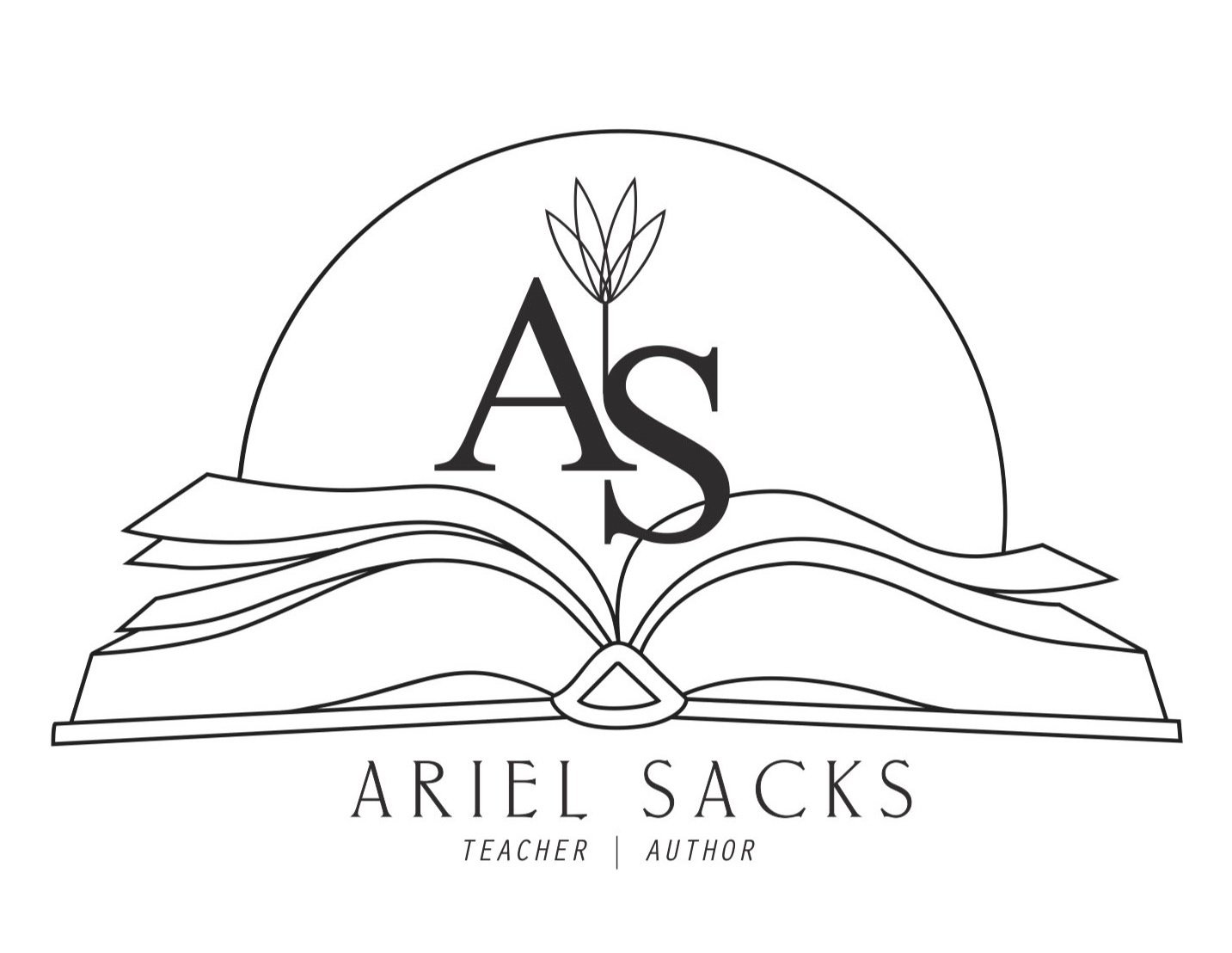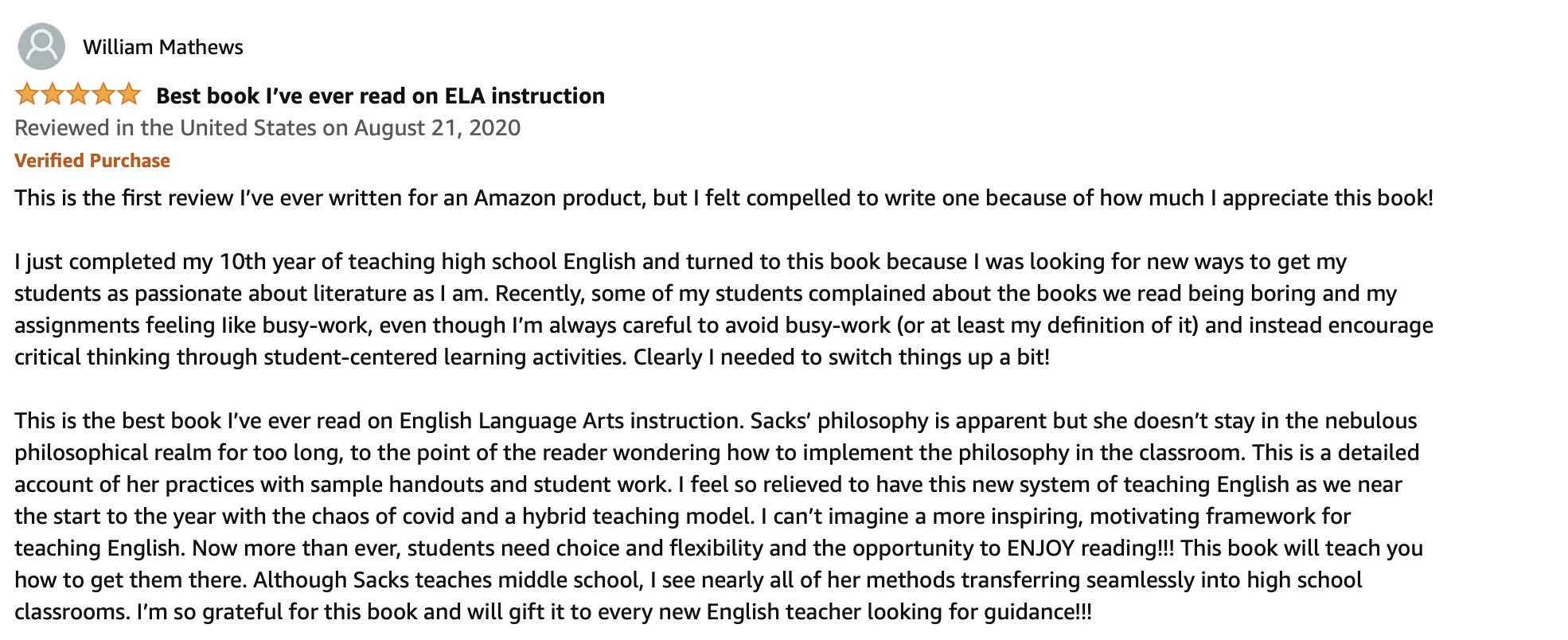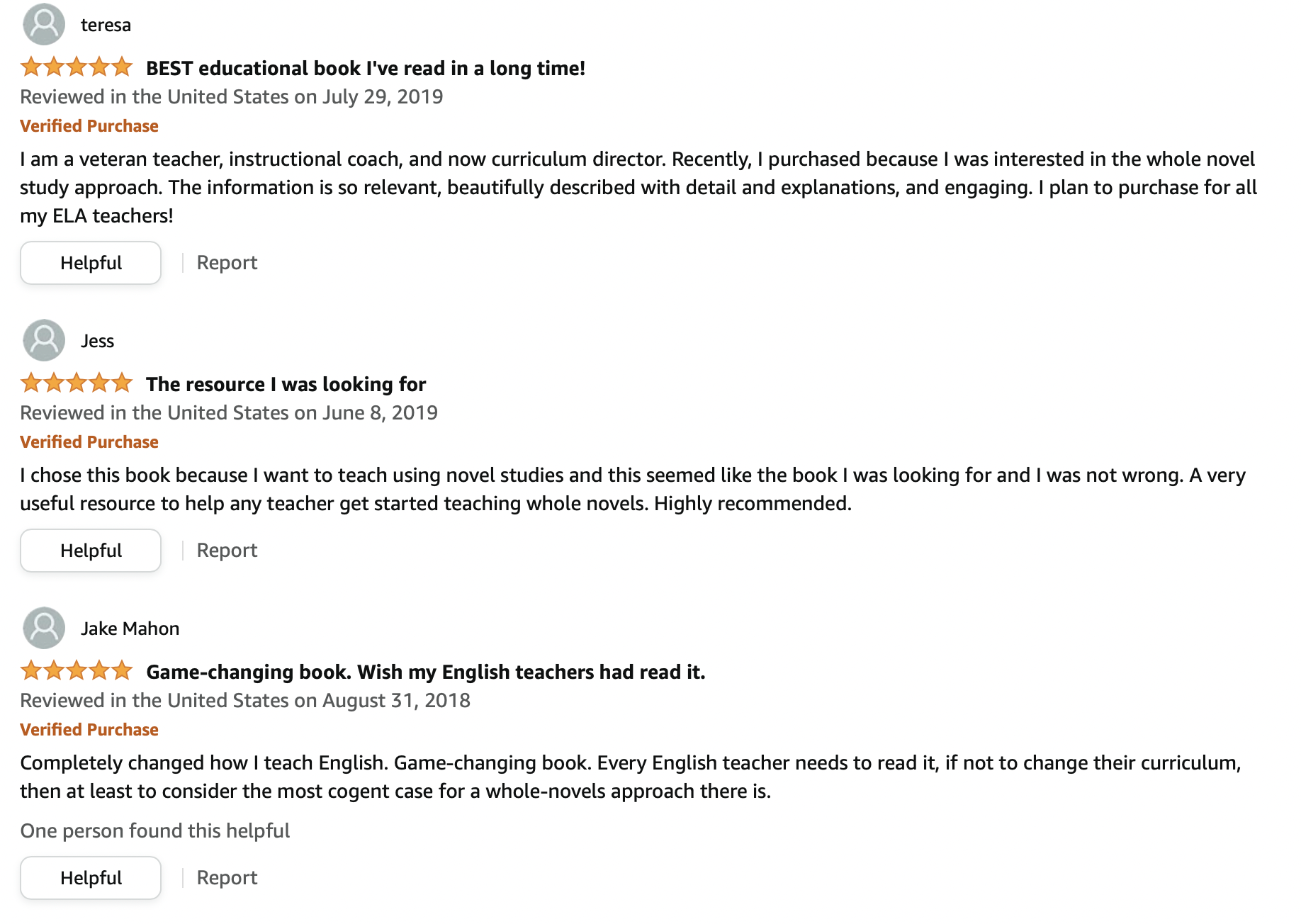Reviews for just-released book, Who Gets To Write Fiction? Opening Doors to Imaginative Writing For All Students!
“…It’s a simple shift, yet one that feels almost revolutionary in this era of scripted curriculum, book bans, and top-down mandates…In Who Gets to Write Fiction? Opening Doors to Imaginative Writing for All Students, New York City English Language Arts teacher, literacy coach, and professional development consultant Ariel Sacks presents a rationale and road map for expanding the place for “imaginative writing” within the English Language Arts (ELA) curriculum. In doing so, Sacks leverages fiction writing as a powerful hook for student engagement with literary craft, centering it as a tool for expression and analysis, a vehicle for learning, and a reflection of learning. Part teaching memoir, part handbook for novice and veteran secondary ELA teachers alike, Who Gets to Write Fiction? offers both big picture thinking and practical application.” —TC Record
“This book has profound implications for teaching. Ariel Sacks shows us how to humanize this test-driven profession with courage, wisdom, and the gorgeous, clear writing of an accomplished storyteller. It is not just the progression of assignments from most accessible to most complex, but the articulate defense of imaginative work that is inspiring, rigorous, and necessary for the overall well-being of us all. You simply must study this book with your colleagues.
Penny Kittle, cofounder of the Book Love Foundation, author of Micro-texts: co-author of 180 Days and 4 Essential Studies
“Ariel Sacks provides a comprehensive playbook for ELA teachers on why and how to engage students in fiction writing. The book shares stories and practical tips for making imaginative writing accessible for all students using a framework that promotes equity and literacy. I highly recommend it for any teacher of writing.”
Starr Sackstein, COO of Mastery Portfolio and author of Hacking Assessment and many other education books.
“Who Gets to Write Fiction? is a clarion call to return fiction writing to the curriculum. Sacks persuasively argues that inspiring students to write stories promotes agency, encourages risk-taking, moves writers away from dull, formulaic writing, and lends voice to students who are often marginalized. The cultivation of creativity in schools should not be a luxury, and this book provides a valuable roadmap on how to bring fiction writing back to its rightful place—your classroom. Highly recommended.”
Kelly Gallagher, author of Write Like This and Teaching Adolescent Writers, co-author of 180 Days and 4 Essential Studies
“Ariel Sacks is one of the more thoughtful and expansive thinkers around literacy that I’ve come across over the course of my career. From the outset of Who Gets to Write Fiction?, the reader recognizes the sense of the urgency with which Sacks treats literacy in her former and present students. Here’s to hoping that, with this book, more of us can incorporate fiction as imaginative dreaming in our work with students!”
José Vilson, educator, executive director of EduColor, and author of This Is Not A Test: A New Narrative on Race, Class, and Education
“This is a book I wish my own teachers had had! Ariel Sacks empowers literacy educatorsto give serious space to imaginative writing in a way that awakens academic and social–emotional learning. With concrete examples, Sacks also shows how this work can shift power dynamics between and among teachers and students. I suspect Who Gets to Write Fiction? will call many English teachers back to the heart of their choice to teach.”
Elena Aguilar, author of The Art of Coaching and Onward, Founder of Bright Morning
“As someone who has taught fiction writing and written fiction about teaching, I found so much to love about this book. It’s a thorough and useful guide that addresses the why and the how of writing fiction with students. Teaching students to read like writers will help them communicate better throughout their lives—and better enjoy the fiction they read. This book will help teachers do these things and so much more.”
Roxanna Elden, educator and author of See Me After Class and Adequate Yearly Progress: A Novel
See below for reviews of Whole Novels For the Whole Class: A Student Centered Approach.
Order here: http://bit.ly/WholeNovels
Released by Jossey Bass / Wiley Publishers, Whole Novels for the Whole Class: A Student Centered Approach includes
A powerful new method for teaching literature, writing, and critical thinking to adolescents
Suggestions for how to use the Whole Novels approach in conjunction with other programs
Video clips of the author using the techniques in her own classroom
Techniques for working with students of varying abilities in reading whole novels
Buy it in paperback or for your e-reader! http://bit.ly/WholeNovels
"Reading this book is like having a powerful conversation with a colleague; a true professional development opportunity for educators as they explore how to facilitate authentic reading experiences for students--and a must read for any teacher who has wondered how to foster a community of readers and then step aside and watch them grow, learn and lead."
--Sarah Henchey, middle grades teacher, NBCT, member of CTQ's Collaboratory
"The first time Ariel Sacks tried out the whole novels approach in a "typical" New York City School. she reports that it didn't work for half of the class. Rather than give up, she set about figuring out how to make it work for the other half of the class. That attitude, along with her inviolable focus, faith and trust in her students, has resulted in the engaging "how to" for the whole novels approach to instruction. More importantly, she has written a clarion call establishing the possibility of all of our children receiving what is currently available to only a few of our children."
--Jon Snyder, Dean of Bank Street College of Education
"Yes, yes. To read a well-crafted book requires a leap of faith, losing oneself for a time. And yet we don't practice--much less even encourage--that kind of reading in our schools. Sacks makes both the argument for doing so and offers the stories we need from classrooms where it's being done."
--Deborah Meier, teacher, author, board member of Coalition of Essential Schools
"Ariel Sacks has been sharing for years on her blog unique ideas for engaging students in higher-order thinking and learning. I'm excited that now we all get to benefit from reading a full-length book where she has the opportunity to fully lay out her approach to English instruction and offer practical lessons!"
--Larry Ferlazzo, teacher, co-author of ESL/ELL Teacher's Survival Guide





